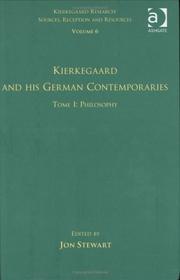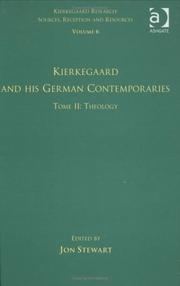| Listing 1 - 10 of 92 | << page >> |
Sort by
|
Book
ISBN: 9781441133991 9781441159687 Year: 2010 Volume: *13 Publisher: London Continuum
Abstract | Keywords | Export | Availability | Bookmark
 Loading...
Loading...Choose an application
- Reference Manager
- EndNote
- RefWorks (Direct export to RefWorks)
Book
ISBN: 9781118783818 1118783816 9781119090120 Year: 2015 Publisher: Chichester Wiley Blackwell
Abstract | Keywords | Export | Availability | Bookmark
 Loading...
Loading...Choose an application
- Reference Manager
- EndNote
- RefWorks (Direct export to RefWorks)
This overview of Kierkegaard includes contributions from an international array of Kierkegaard scholars from across the disciplines. It covers Kierkegaard's studies in philosophy, theology and religion and other subjects. The authors elucidate Kierkegaard's contribution to each of these areas through examining the sources he drew upon. Charting the reception of his ideas, they analyze his unique conceptual insights into each topic. This work demystifies the complex field of Kierkegaard studies creating an accessible entry-point into his thought and writings for readers who are new to his work.
Kierkegaard, Søren --- Philosophy, Modern --- Philosophy, Modern. --- Kierkegaard, Søren, --- 1800-1899.
Book
ISBN: 9781472512765 9781472507938 9781472513922 Year: 2013 Publisher: London Bloomsbury
Abstract | Keywords | Export | Availability | Bookmark
 Loading...
Loading...Choose an application
- Reference Manager
- EndNote
- RefWorks (Direct export to RefWorks)
History of philosophy --- Literature --- Philosophy --- Philosophie --- Authorship. --- Art d'écrire --- Authorship --- Art d'écrire. --- Art d'écrire.
Book
ISBN: 0091262305 0091262313 9780091262303 9780091262310 Year: 1976 Publisher: London Hutchinson
Abstract | Keywords | Export | Availability | Bookmark
 Loading...
Loading...Choose an application
- Reference Manager
- EndNote
- RefWorks (Direct export to RefWorks)
Book
ISBN: 0860038149 0860038157 Year: 1991 Publisher: New York Allan
Abstract | Keywords | Export | Availability | Bookmark
 Loading...
Loading...Choose an application
- Reference Manager
- EndNote
- RefWorks (Direct export to RefWorks)
Quantitative methods (economics) --- AA / International- internationaal --- 303.0 --- 305.0 --- Statistische technieken in econometrie. Wiskundige statistiek (algemene werken en handboeken). --- Toegepaste econometrie en statistiek (algemene naslagwerken). Statistische onderzoekingen en studiën. --- 330.115 --- Econometrics --- Economics, Mathematical --- Statistics --- Econometrie --- Econometrics. --- 330.115 Econometrie --- Statistische technieken in econometrie. Wiskundige statistiek (algemene werken en handboeken) --- Toegepaste econometrie en statistiek (algemene naslagwerken). Statistische onderzoekingen en studiën
Book
ISBN: 9780198747703 Year: 2015 Publisher: Oxford Oxford University Press
Abstract | Keywords | Export | Availability | Bookmark
 Loading...
Loading...Choose an application
- Reference Manager
- EndNote
- RefWorks (Direct export to RefWorks)
Book
ISBN: 9781409446385 9781315234861 9781351875318 9781138267022 1409446387 Year: 2012 Volume: 11/2 Publisher: Aldershot Ashgate
Abstract | Keywords | Export | Availability | Bookmark
 Loading...
Loading...Choose an application
- Reference Manager
- EndNote
- RefWorks (Direct export to RefWorks)
Kierkegaard's relation to the field of philosophy is a particularly complex and disputed one. He rejected the model of philosophical inquiry that was mainstream in his day and was careful to have his pseudonymous authors repeatedly disassociate themselves from philosophy. But although it seems clear that Kierkegaard never regarded himself as a philosopher, there can be no doubt that his writings contain philosophical ideas and insights and have been profoundly influential in a number of different philosophical traditions. The tomes in this volume seek to document the different traditions of the philosophical reception of Kierkegaard's thought and the articles demonstrate the reach of Kierkegaard's writings in philosophical contexts that were often different from his own. The present volume attempts to document these different traditions of the philosophical reception of Kierkegaard's thought. The articles featured here aim to demonstrate the vast reach of Kierkegaard's writings in philosophical contexts that were often quite different from his own. Tome II is dedicated to exploring Kierkegaard's influence on Francophone philosophy. The French intellectual tradition squares well with Kierkegaard's eclectic profile since its leading figures are often difficult to classify unambiguously as philosophers, theologians, literary critics or simply writers. Kierkegaard's thinking was highly influential for many generations of French philosophers right up to the present. It was not just existentialism that tried to co-opt Kierkegaard for its own purposes; he has also been influential in the context of almost every modern school of French thought: phenomenology, feminism, structuralism, post-structuralism, semiotics, and deconstruction.
Philosophers --- Philosophy --- Kierkegaard, Sren, --- Influence --- Mental philosophy --- Humanities --- Scholars --- Kierkegaard, Søren, --- Kierkegaard, Søren --- Anti-climacus --- H. H. --- Influence. --- Philosophers - French-speaking countries --- Philosophy - French-speaking countries --- Kierkegaard, Søren, - 1813-1855 - Influence --- Anti-Climacus, --- Bogbinder, Hilarius, --- Chʻi-kʻo-kuo, --- Climacus, Johannes, --- Constantius, Constantin, --- Eremita, Victor, --- Haufniensis, Vigilius, --- Johannes, Climacus, --- Johannes de Silentio, --- Kʹerkegor, Seren, --- Kierkegaard, S. --- Kierkegaard, Severino, --- Kierkegaard, Søren Aabye, --- K'i︠e︡rkegor, Sʹoren, --- Kīrkajūrd, Sūrīn, --- Kirkegaard, Soeren, --- Kirkegor, Seren, --- Ḳirḳegor, Sern, --- Kirkegors, Sērens, --- Kirukegōru, Søren, --- Kjerkegor, Seren, --- Kʻo-erh-kʻai-ko-erh, --- Notabene, Nicolaus, --- Silentio, Johannes de, --- Sūrīn Kīrkajūrd, --- Victor, Eremita, --- Vigilius, Haufniensis, --- קירקגור, סרן --- קירקגור, סורן --- קירקגור, סירן --- קירקגור, סירן, --- קירקגורד, סרן, --- 克尓凯郭尓, --- Kierkegaard, Søren, - 1813-1855
Book
ISBN: 9781409442851 9781315234878 9781351875349 9781138253797 1409442853 Year: 2012 Volume: 11/1 Publisher: Aldershot Ashgate
Abstract | Keywords | Export | Availability | Bookmark
 Loading...
Loading...Choose an application
- Reference Manager
- EndNote
- RefWorks (Direct export to RefWorks)
Kierkegaard's relation to the field of philosophy is a particularly complex and disputed one. He rejected the model of philosophical inquiry that was mainstream in his day and was careful to have his pseudonymous authors repeatedly disassociate themselves from philosophy. But although it seems clear that Kierkegaard never regarded himself as a philosopher, there can be no doubt that his writings contain philosophical ideas and insights and have been profoundly influential in a number of different philosophical traditions. The present volume documents these different traditions of the philosophical reception of Kierkegaard's thought and the articles featured demonstrate the vast reach of Kierkegaard's writings in philosophical contexts that were often quite different from his own. Tome I is dedicated to exploring the reception of Kierkegaard in Germanophone and Scandinavian philosophy. Kierkegaard has been a major influence for such different philosophical projects as phenomenology, hermeneutics, dialogical thinking, critical theory, Marxism, logical positivism and ordinary language philosophy. Similarly in Denmark and Norway Kierkegaard's writings have been more or less constantly discussed by important philosophers, despite the later dominance of analytic philosophy in these countries. The present tome features articles on the leading Germanophone and Scandinavian philosophers influenced by Kierkegaard's thought.
Philosophers --- Philosophy --- Kierkegaard, Sren, --- Influence --- Philosophy, German --- Mental philosophy --- Humanities --- German philosophy --- Scholars --- Kierkegaard, Søren --- Anti-climacus --- H. H. --- Influence. --- Kierkegaard, Søren, --- Philosophers - French-speaking countries --- Philosophy - French-speaking countries --- Kierkegaard, Søren, - 1813-1855 - Influence --- Anti-Climacus, --- Bogbinder, Hilarius, --- Chʻi-kʻo-kuo, --- Climacus, Johannes, --- Constantius, Constantin, --- Eremita, Victor, --- Haufniensis, Vigilius, --- Johannes, Climacus, --- Johannes de Silentio, --- Kʹerkegor, Seren, --- Kierkegaard, S. --- Kierkegaard, Severino, --- Kierkegaard, Søren Aabye, --- K'i︠e︡rkegor, Sʹoren, --- Kīrkajūrd, Sūrīn, --- Kirkegaard, Soeren, --- Kirkegor, Seren, --- Ḳirḳegor, Sern, --- Kirkegors, Sērens, --- Kirukegōru, Søren, --- Kjerkegor, Seren, --- Kʻo-erh-kʻai-ko-erh, --- Notabene, Nicolaus, --- Silentio, Johannes de, --- Sūrīn Kīrkajūrd, --- Victor, Eremita, --- Vigilius, Haufniensis, --- קירקגור, סרן --- קירקגור, סורן --- קירקגור, סירן --- קירקגור, סירן, --- קירקגורד, סרן, --- 克尓凯郭尓, --- Kierkegaard, Søren, - 1813-1855

ISBN: 9780754661825 9781315234588 9781351874472 9781138273269 0754661822 Year: 2007 Volume: 6/1 Publisher: Aldershot Ashgate
Abstract | Keywords | Export | Availability | Bookmark
 Loading...
Loading...Choose an application
- Reference Manager
- EndNote
- RefWorks (Direct export to RefWorks)
This volume explores in detail Kierkegaard's various relations to his German contemporaries. Kierkegaard read German fluently and made extensive use of the writings of German-speaking authors. Apart from his contemporary Danish sources, the German sources were probably the most important in the development of his thought generally. This volume represents source-work research dedicated to tracing Kierkegaard's readings and use of the various German-speaking authors in the different fields in a way that is as clearly documented as possible.The volume has been divided into three tomes reflecting Kierkegaard's main areas of interest with regard to the German-speaking sources, namely, philosophy, theology and a more loosely conceived category, which has here been designated "literature and aesthetics." This first tome treats the German philosophical influences on Kierkegaard. The dependence of Danish philosophy on German philosophy is beyond question. In a book review in his Hegelian journal Perseus, the poet, playwright and critic, Johan Ludvig Heiberg laments the sad state of philosophy in Denmark, while lauding German speculative philosophy. Moreover, Kierkegaard's lifelong enemy, the theologian Hans Lassen Martensen claims without exaggeration that the Danish systems of philosophy can be regarded as the "disjecta membra" of earlier German systems. All of the major German idealist philosophers made an impact in Denmark: Kant, Fichte, Schelling, and most significantly, Hegel. Kierkegaard was widely read in the German philosophical literature, which he made use of in countless ways throughout his authorship.
Kierkegaard, Sren, --- Kierkegaard, Søren, --- Kierkegaard, Søren, - 1813-1855

ISBN: 9780754661320 9781315234571 9781351874441 9781138273627 0754661326 Year: 2007 Volume: 6/2 Publisher: Aldershot Ashgate
Abstract | Keywords | Export | Availability | Bookmark
 Loading...
Loading...Choose an application
- Reference Manager
- EndNote
- RefWorks (Direct export to RefWorks)
This volume explores in detail Kierkegaard's various relations to his German contemporaries. Kierkegaard read German fluently and made extensive use of the writings of German-speaking authors. Apart from his contemporary Danish sources, the German sources were probably the most important in the development of his thought generally. This volume represents source-work research dedicated to tracing Kierkegaard's readings and use of the various German-speaking authors in the different fields in a way that is as clearly documented as possible. The volume has been divided into three tomes reflecting Kierkegaard's main areas of interest with regard to the German-speaking sources, namely, philosophy, theology and a more loosely conceived category, which has here been designated "literature and aesthetics." This second tome of the present volume is dedicated to Kierkegaard's main theological influences. In theology the German and the Danish traditions had long been closely connected via their common source: Luther. In Kierkegaard's time the main influence on theology was probably German philosophy and specifically Hegelianism. Most of the German theologians were in some way in a critical dialogue with this movement. Another important influence was Schleiermacher, who visited Copenhagen in 1833 and was important for several Golden Age thinkers. From his student days Kierkegaard kept abreast of the German theological literature, from which he drew much inspiration.
Kierkegaard, Sren, --- Kierkegaard, Søren, --- Kierkegaard, Søren, - 1813-1855
| Listing 1 - 10 of 92 | << page >> |
Sort by
|

 Search
Search Feedback
Feedback About UniCat
About UniCat  Help
Help News
News